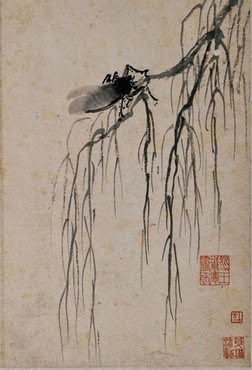Cicadas, those tiny little fellows
- Details

Surely, Chabrier has more music than his famous rhapsody and today we're listening to one of his songs, included in our ten buggy songs list. He was born in 1841, so he is part of the first generation of mélodie composers, like Fauré and Duparc. He was very respected by his contemporaries because of his natural skill for melodies, his original, unmistakable harmonies and his funny and also affectionate sense of humor. A good example of his sense of humor are the four "zoological” romances; As soon as you read the titles you are eager to listen to them: Ballade des gros dindons and Pastorale des cochons roses, with poems by Edmond Ronstand (the author of Cyrano de Bergerac) and Villanelle des petits canards and Les cigales with poems by Rosemonde Gérard. The four songs were published in 1890 as part of Six Melodies, the last compilation published by Chabrier; Debussy described them as “masterpieces of great fantasy” and Poulenc and Ravel was inspired by them to write their Histoires naturelles and Bestiaire; we'll soon talk about both works as there is a song from every cycle in our buggy list.
Today we're not talking about turkeys, ducks or pigs, we're talking about cicadas. The poem Les cigales was written by Rosemonde Gérard and belongs to her collection Les pipeaux, published in 1889, when she was twenty-three. The book was highly appreciated by critics and became a success, but Gérard didn't publish any other one until 1926, when she was a widow, because she had married Edmond Ronstand in 1890 and had put her talent at her husband’s service (some people would say that she was his muse; some others that his muse often rewrote his texts).
Rosemonde Gérard structured her poem in three parts, each part with three stanzas, the last of which is a refrain. Chabrier kept this structure, separating each part (which refers to a different time of the day) with a piano interlude and emphasizing the refrain with (this is a warning) a catchy tune; you can spend the whole day humming "les cigales, ces bestioles...". And the cicadas, where do we hear them? As you can imagine, in the piano, with arpeggiated chords that imitate the cicada singing.
Obviously, every song should be sung with intelligence and elegance, but with funny songs it's so easy to overact... But don't worry, Susan Graham and Malcolm Martineau have plenty of intelligence and elegance.
Le soleil est droit sur la sente,
L’ombre bleuit sous les figuiers;
Ces cris au loin multipliés,
C’est Midi, c’est Midi qui chante.
Sous l’astre qui conduit le chœur,
Les chanteuses dissimulées
Jettent leur rauques ululées
De quel infatigable cœur.
Les cigales, ces bestioles,
Ont plus d’âme que les violes;
Les cigales, les cigalons,
Chantent mieux que les violons!
S’en donnent-elles les cigales,
Sur les tas de poussière gris,
Sous les oliviers rabougris
Étoilés de fleurettes pâles.
Et grises de chanter ainsi,
Elles font leur musique folle;
Et toujours leur chanson s’envole
Des touffes du gazon roussi!
Les cigales, ces bestioles,
Ont plus d’âme que les violes:
Les cigales, les cigalons,
Chantent mieux que les violons!
Aux rustres épars dans le chaume,
Le grand astre torrentiel,
À large flots, du haut du ciel,
Verse le sommeil et son baume.
Tout est mort, rien ne bruit plus
Qu’elles, toujours, les forcenées,
Entre les notes égrénées
De quelque lointain angélus!
Les cigales, ces bestioles,
Ont plus d’âme que les violes:
Les cigales, les cigalons,
Chantent mieux que les violons!
As the sun climbs higher and higher,
patches of shade keep shrinking
and noise multiplies on every side:
it is noon, summer noon is singing!
Directed by the blazing star
is a chorus, who have rehearsed their parts,
broadcasting a raucous cantata
with resolute and tireless hearts.
The cicadas, those tiny fellows,
out-vibrato the loudest cellos.
The cicadas' concerted din
outperforms any violin!
They overdo it, the cicadas;
they indulgently wallow
in among the old olive-trees
and the flowers of the dusty hollow.
Enchanted with their power to sing,
they press on with their crazy musicking.
Through the branches and browning grasses
their unremitting song takes wing.
The cicadas, those tiny fellows,
out-vibrato the loudest cellos.
The cicadas' concerted din
outperforms any violin!
And since for the work-weary peasants
the abundant sun of summer
in ample waves from high above
pours the magic potion of slumber,
all is still, to mark this special hour...
except for these fanatics
filling in the spaces between
the chimes of the distant church tower!
The cicadas, those tiny fellows,
out-vibrato the loudest cellos.
The cicadas' concerted din
outperforms any violin!













Comments powered by CComment